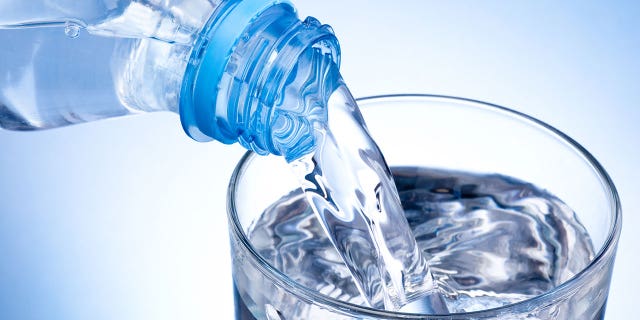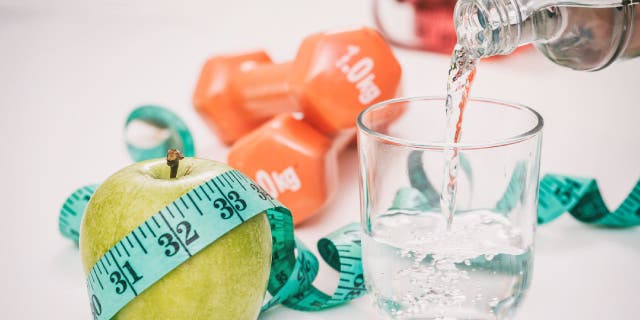There’s a widespread belief that drinking a gallon of water a day can help with weight loss and muscle building.
Fitness professionals and amateurs have long recommended drinking a gallon of water – or 128 fluid ounces. There are first-person articles, blogs, videos and photo series documenting body transformations that have reportedly yielded both internal and external results.
People have shared their water-drinking challenges on such image-focused social media platforms as TikTok, YouTube, Instagram and Pinterest.
RUNNING 1 MILE A DAY IS GAINING POPULARITY ONLINE: HOW IT CAN IMPROVE YOUR HEALTH
‘Water intake helps boost metabolism’
Dr. Kevin Huffman, a physician from Vermilion, Ohio, told Fox News Digital that drinking a gallon of water per day has health benefits that can aid weight loss and fitness goals — but the practice has limits.
“Water intake helps boost metabolism while keeping you hydrated throughout the day,” Huffman said. “Also, consistent hydration helps you feel satiated for longer parts of the day, reducing your food consumption and facilitating weight loss.”
SHOULD YOU DRINK WATER BEFORE BED? EXPERTS CHIME IN
“Drinking water alone won’t help maximize weight loss.”
What about ‘water intoxication’?
Drinking excessive amounts of water in a short amount of time could result in hyponatremia, which is a rare life-threatening condition colloquially known as “water intoxication.”

Water intoxication, also known as hyponatremia, is a rare health condition that can happen when someone drinks an excessive amount of water in a short amount of time and flushes out too much sodium. (iStock)
Hyponatremia occurs when sodium levels (AKA electrolytes) in the blood are below normal, usually when someone consumes too much fluid, according to the National Institutes of Health (NIH).
Sodium is a mineral that aids muscle contraction and hydration, balances blood acidity and pressure, regulates nerve function and rebuilds damaged tissue.
Having a sodium level blood reading below 135 milliequivalents per liter (mEq/L) is considered lower than normal, according to the National Institutes of Health.

Drinking too much water can cause symptoms that seem similar to dehydration, including fatigue, blurred vision and headaches. (iStock)
Signs of hyponatremia include fatigue, nausea, vomiting, headaches, blurred vision, mental status changes, muscle tremors and cramps, psychosis, seizures, increased salivation, diarrhea, hyperpyrexia and anhidrosis.
Water and weight loss: How to get a metabolic boost from H20
Kimberly Gomer, a registered and licensed dietitian nutritionist from Miami, Florida, who holds a master’s in nutrition and works as a director of nutrition at Body Beautiful Miami, a body contouring facility, told Fox News Digital there’s “evidenced-based research” that suggests water can provide “a metabolic boost for weight loss.”
“Water alone — not other fluids — has been shown to have the most positive weight loss benefit. It also fills a person up and helps them be more mindful right before a meal.”

Drinking water can help with weight loss, but it’s not the only contributing factor. (iStock)
Wwater makes up about 50% to 70% of a person’s body weight, Gomer added.
Who might need more water?
Some people may need to drink more water than others to optimize their health.

A person’s lifestyle, health, workout routine and environment can play a role in how much water should be consumed. (iStock)
Health conditions that may require higher water intake include bladder infections or kidney stones, said Gomer. Women who are pregnant or nursing may also require more water.
Temporary ailments that cause fever, vomiting, or diarrhea will also require more fluids and electrolytes for recovery.
CLICK HERE TO SIGN UP FOR OUR LIFESTYLE NEWSLETTER
“Water helps regulate body temperature, assists in getting rid of waste (via urination, perspiration and bowel movements), lubricates and cushions joints, and protects sensitive tissues.”
Inadequate water intake can lead to mild or severe dehydration, which could include feelings of thirst, fatigue, dizziness, headache, fast heart rate, fainting and other undesirable symptoms. In rare or extreme cases, dehydration can cause death.
FOLLOW US ON FACEBOOK FOR MORE FOX LIFESTYLE NEWS

Drinking water generally has more benefits than detriments for overall health. (iStock)
“Engaging in exercise or any activity that makes you sweat will require you to drink extra water to compensate for the fluid loss,” said Wang.
“An extra 1.5 to 2.5 cups should suffice for short bouts of exercise, but intense exercise lasting more than an hour will require more.”
CLICK HERE TO GET THE FOX NEWS APP

